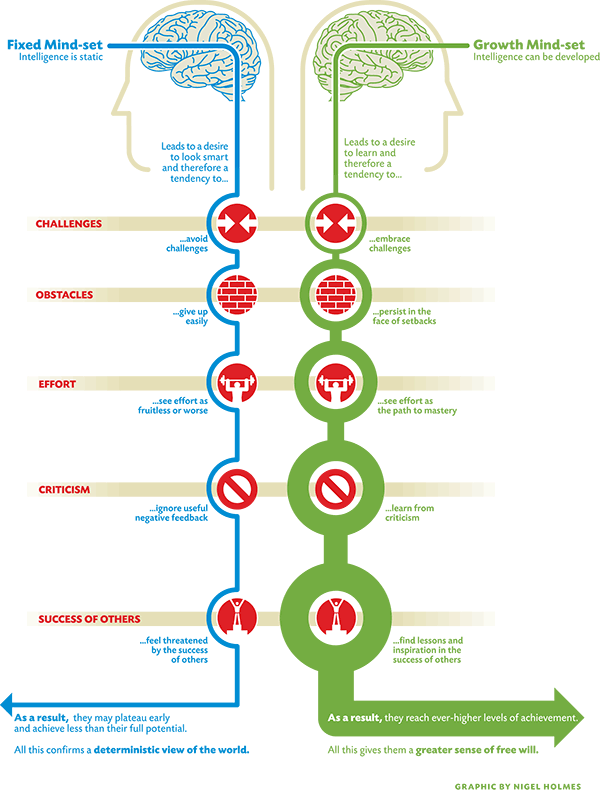
If we really want to take advantage of all the opportunities that the digital information age offers, we need to move away from fixed mindset to growth mindset thinking. Carol Dweck, Professor of Psychology at Stanford University, the author of Mindset: The New Psychology of Success (Random House, 2006) and the article Even Geniuses Work Hard posits that if students with a Fixed Mindset believe that intelligence is an inborn trait and is essentially fixed they:
(Random House, 2006) and the article Even Geniuses Work Hard posits that if students with a Fixed Mindset believe that intelligence is an inborn trait and is essentially fixed they:
- Tend to view looking smart above all else;
- May sacrifice important opportunities to learn—even those that are important to their future academic success—if those opportunities require them to risk performing poorly or admitting deficiencies;
- Believe that if you have ability, everything should come naturally;
- Tell us that when they have to work hard, they feel dumb;
- Believe that setbacks call their intelligence into question, they become discouraged or defensive when they don’t succeed right away;
- May quickly withdraw their effort, blame others, lie about their scores, or consider cheating.
In contrast Dweck explains that students with a Growth Mindset believe that they can develop their intelligence over time and subsequently will:
- View challenging work as an opportunity to learn and grow;
- Meet difficult problems, ones they could not solve yet, with great relish;
- Say things like “I love a challenge,” “Mistakes are our friends,” and “I was hoping this would be informative!”
- Value effort; they realize that even geniuses have to work hard to develop their abilities and make their contributions;
- More likely to respond to initial obstacles by remaining involved, trying new strategies, and using all the resources at their disposal for learning.
The fixed mindset, or as it is more often referred to as innate intelligence, was the widely accepted theory of cognitive development until 60’s when UC Berkley professor Mark Rosenzweig replicable studies made the case for the environmental impact on brain development and plasticity. It is now widely accepted that the brain remains plastic and adapts to our constantly changing environment which is foundational to Dweck’s argument for the growth mindset.
This notion of adapting to a constantly changing environment is also important when we consider our move from a static print information age to the dynamic digital information age.
The emphases of the print information age and print culture include:
- development of systems of cataloging and retrieval
- emphasis on memorization
- information as primary, analysis as secondary
- centralization of instructional space
- learning as hierarchical, “objective,” and categorized
- standardization paramount
Therefore, the greatest challenge of the print information age is finding existing or fixed information. A learning environment that is based on the print culture will emphasize memorization and regurgitation of standardized information.
In contrast the emphasis of the digital information age and digital culture include:
- systems of communication & interconnection
- emphasis on participation
- analysis, critique & “remixing” as primary
- information as a “commodity”
- centralization of creation & production
- emphasis on community & social interaction
The greatest challenge of the digital information age will be assessing Information and making meaningful connections between existing information and new information that is developed. A learning environment that is based on digital culture will emphasize, creation, communication, and participation as primary and hold information simply as a commodity or a product of interconnected human endeavours.
Considering that we have moved into and have been in the digital information age for at least the past two decades we need to consider our roles as educators and look long and hard at the changes we need to make to our learning systems. The following questions are central to how I will be responding to how I see my role as an educator in the 21st Century:
- If I imagine my primary job as a teacher is to serve information, am I helping solve the current informational problem or make it worse?
- And given the vast complexity of the informational network, if I insist on my centrality, does that establish or harm my credibility as a teacher?
- If assessing information – and the wisdom & experience that requires – is the central challenge of the current informational age, are teachers more or less necessary?
Helping learners assess the vast amounts of information that is available and giving them necessary skills and abilities that they need to make meaningful and useful connections is more important than it has ever been. Learning is an active and dynamic process in which learners construct new ideas or concepts based upon their current/past knowledge. The making of meaningful connections in the digital information age is key to the learning and knowing.
We need to move from fixed mindset thinking and the passive educational environment of main lecture points, rubrics, individual competition and standardized testing to growth mindset thinking of active learning, dynamic interactivity, critical and analytical thinking, collaboration and meaningful projects.

































